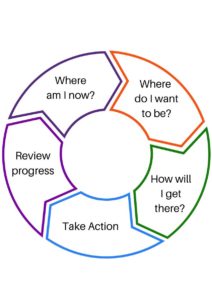During 2020/21 I have supported over 100 people looking for work. Many of them had been made redundant. Some were taking this as an opportunity for doing something new, others wanted to remain in a similar kind of role. We talked about taking control of their career and the power to create their future.
Take control of your career
When it comes to thinking about our careers, particularly looking for a new job, there is often a feeling that it is out of our control. Whether it’s stories that there are no jobs or the feeling of having to ‘play the game’ it can feel hopeless at times.
Right now is no different. One of the themes I have noticed is that everything is taking a little bit longer than it did pre-covid. It is a source of anxiety for those searching for a new role. Rationally, could be down to a number of things – caution over lockdown restrictions, illness, change in working hours. The thing to remember is that all of these reasons and many others are out of your control.
The key thing with careers coaching is focusing on the things you can control:
- Researching the kinds of roles you want
- Researching companies
- Building your own self-awareness around your values, skills and experience
- Getting your CV in top shape
- Preparing well for an interview
Remember: you have the power to create your future
We all have the power to create our own future. The actions we take and the plans we make can influence the outcomes. When it comes to our career 80% of people I speak to have no plan. They often arrive in my inbox with no idea how they got to this point in the career. This has a name – a happenstance career. For some people it can actually be part of a plan – you plan to say yes to the opportunities that come your way and see where it takes you. For others, it leads them down a path they didn’t mean to take.
Regardless of whether it’s a plan that isn’t a plan or a more detailed plan, a career plan is important.
Why do you need a career plan?
I know that the reality of this situation is that it feels like we already have a million things to do, so why would anyone spend time planning their career? The simple answer is because it allows you to become more self-aware. Creating a career plan allows you to think about your skills and interests, set career goals, and put actions in place that will help you reach those goals. Planning your career is a great way to ensure your career is going in the right direction and if you are looking for a new role, it will help you answer any career goal questions at your next interview. By assessing your situation, you’ll additionally be able to determine and fill any gaps in your knowledge or experience that might be holding you back from your dream job.
Career planning cycle

Five key stages of your career plan:
- Where are you right now? Think about your strengths, what you enjoy, what’s important to you. Also, consider any gaps in your knowledge/experience.
- Where do you want to be? Consider your short, medium and long term goals (6m, 12m, 3-5y)
- How will you get there? What is one thing that you can do now to take yourself one step closer?
- Take that action! Break tasks down into the smallest steps so that you can make progress easily
- Review your progress on a timescale that works for you – quarterly, monthly, even weekly if you want to.
Taking action in your career plan
Once you have a plan, you can put it into action. You might set small goals such as
- Connecting with someone new in your field via LinkedIn each week
- Taking up some self-learning or training in an area of interest an hour a week
- Setting up alerts for your ideal role
Every small action adds up and the more you do, the more you create your future career.

